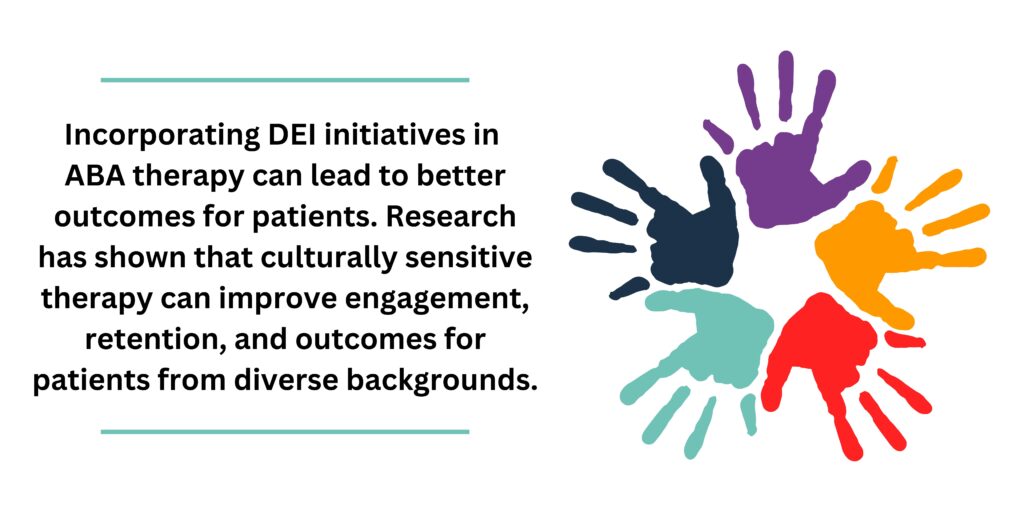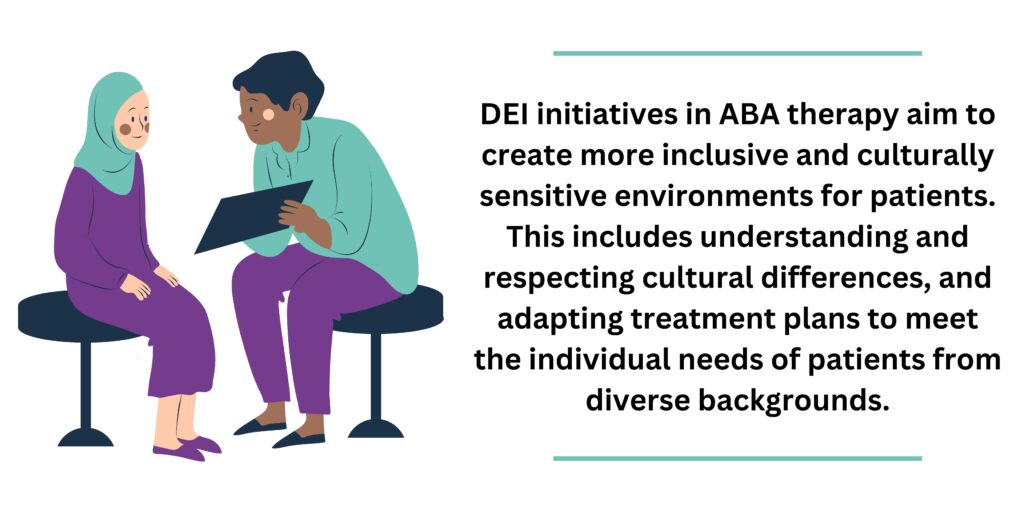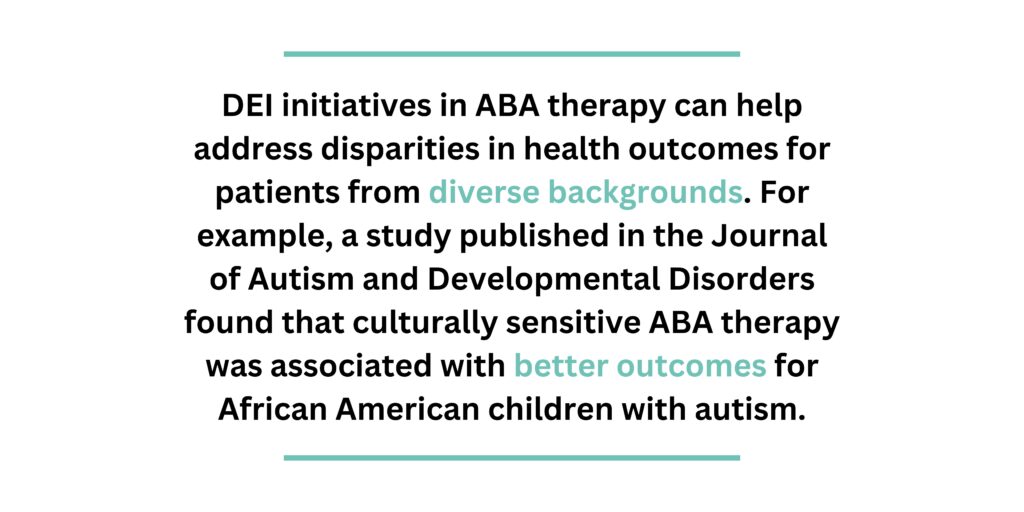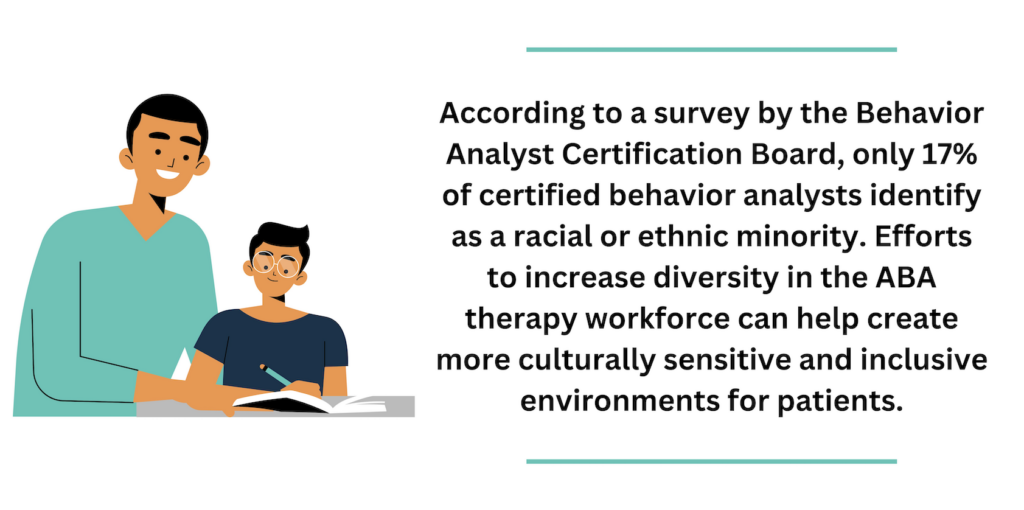Resources for ABA Therapists to Create More Inclusive Spaces
Applied Behavior Analysis therapy has been practiced for more than a half-century, but the discipline has always evolved in step with new understandings of patient needs. In recent years, this has meant an increased focus on diversity, equity, and inclusion (DEI) initiatives to make ABA therapy services accessible to all patients.


If you are an ABA therapist, it’s imperative that you educate yourself on best practices to create an inclusive therapeutic environment.
After all, as a clinician you will be working with people under vulnerable circumstances that will require you to build trust across a variety of differences. Educating yourself on diversity initiatives will help you establish your working dynamics with patients in a way that is considerate of their unique needs, allowing them to get the very most out of your time with them. In this way, you can understand that pursuing a DEI education is a larger investment in your clinical practice.
It’s important to note that creating a welcoming space for those of all backgrounds is not something an ABA therapist can do by instinct alone. Different communities face different hardships and political situations, and therapists must put in work to gain an understanding of how to set up unbiased, affirmative care for all.
The guide below includes links to resources to help ABA therapists work with a wide variety of patients and set up therapeutic practices that are inclusive to all.
Those with Disabilities
This resource explains how those with disabilities can find access to ABA therapy and is a useful guide for ABA practitioners to advise patients with disabilities on how to receive affordable and accessible care.
REPORT: Quality of Life for People with Disabilities
This report by Research and Practice for Persons with Severe Disabilities is written specifically for ABA practitioners to approach working with clients with physical incapacities.
Women


Agenda Alliance: Women’s Mental Health Facts
Agenda Alliance is a nonprofit organization focused on providing mental health services for at-risk women. Their fact sheet includes data-driven analysis for mental health practitioners to understand the key issues facing underserved women.
American Psychiatric Association
This guide from the APA is a primer for mental health professionals focused on supporting female patients and establishing more equitable practices. It features a guide to best practices as well as mental health facts for women.
National Institute of Mental Health: Women and Mental Health
This guide by the National Institute of Mental Health outlines the unique attributes of women’s mental health that practitioners should know to make their practices more equitable across gender lines. It includes articles, videos, and a directory of supportive organizations for women struggling with a variety of mental health concerns.
Office on Women’s Health (OASH)
OASH is a government organization that aims to promote women’s health issues, including mental health. This resource is designed to outline several of the most important ways for therapists and counselors to meet women’s needs.
Substance Abuse and Mental Health Services Administration (SAMHSA)
This index from SAMHSA, a government organization, provides data-driven information including a report by the World Health Organization on the state of gender and mental health, with information about gender disparities, gender bias, women’s specific mental health care needs, and more.
LGBTQ+
This guide from the APA is designed to acclimate therapists, including ABA counselors, to working with transgender and gender non-conforming patients, giving an outline of key mental health issues and what mental health professionals can do to create a bias-free environment.
The Center for LGBTQ Evidence-based Applied Research
CLEAR is a research institute run by the University of Palo Alto that provides resources and issue-based training materials for mental health professionals including ABA therapists to create inclusive spaces for LGBTQ+ people.
Journal of LGBTQ+ Issues in Counseling
This annual journal, sponsored by the American Counseling Association, is a resource by and for ABA counselors, therapists, and other mental health professionals focused on the LGBTQ+ experience. It features research on a variety of therapy modalities to help clinicians.
The Trevor Project is a national organization that provides mental health resources for LGBTQIA+ individuals, in particular young people. Their website features numerous articles to help professionals like ABA therapists provide supportive, gender-affirming services.
Society for Sexual, Affectional, Intersex, and Gender Expansive Identities (SAIGE)
This organization is devoted to helping ABA counselors and other mental health professionals provide support to LGBTQIA+ patients. Their resources include educational materials, podcasts, advocacy efforts, and more.
BIPOC


Behavioral Health Center of Excellence (BHCOE)
This guide from the BHCOE outlines best practices to help ABA therapists support patients of color and run equitable businesses. Their resources include guidelines for self-assessment and evaluation.
International Society for Autism Research (INSAR)
INSAR is a scientific organization providing research on autism to help ABA professionals. Their anti-racist resources provide materials to educate ABA therapists on creating a safe and supportive environment for BIPOC patients.
MSU Autism Lab: Anti-Black Racism Resources for Autism Clinicians
This program from Michigan State University is focused on improving mental health services for BIPOC living with autism. This guide is specifically designed for ABA therapists looking for practical tools to support clients of color.
National Indian Child Welfare Association (NICWA)
NICWA is an organization that provides directed support for Native American youth across a range of needs including mental health. Their resources for mental health providers includes training programs, fact sheets, and even a six-week course for those specializing with the Native American / indigenous community.
PrioritiesABA: Structural Racism and Its Impact on ABA
This series of articles from PrioritiesABA is specifically focused on ABA counseling, identifying the underlying factors that have interfered with providing supportive services to BIPOC patients and proposing new strategies to combat prejudice as a clinician.
AAPI
This index provides extensive resources organized by topic for mental health practitioners to expand their supportive services for AAPI patients, in particular youths. It also includes links to resources on racial trauma and a guide of support groups.
Asian Americans Advancing Justice
AAAJ is a nonprofit organization offering legal advocacy and community empowerment for AAPI individuals. These include educational materials to help mental health professionals support AAPI clients.
The Asian American Psychological Association (AAPA)
The AAPA is an organization that supports AAPI mental health professionals as well as helps therapists and counselors give thoughtful, conscientious services to AAPI patients. Their website includes the Asian American Journal of Psychology, which includes both theoretical and practice-oriented resources to support AAPI patients.
Association of Asian Pacific Community Health Organizations
AAPCHO provides wide-ranging resources and support for community-based health care providers who serve AAPI individuals, with focus areas including mental health services. It also includes information to help low-income clients find supportive services.
National Asian American Pacific Islander Mental Health Association
NAAPIMHA is an organization that provides resources and support for mental health providers and advocates for AAPI mental health. Their offerings include advocacy campaigns, trainings and webinars, and more.
LatinX


Latino Association for Behavior Analysis (ABA)
This organization is designed to make the field of behavioral analysis more equitable for LatinX patients and practitioners alike. They host numerous educational and network-building events to spread knowledge and create a stronger LatinX community in the counseling field.
National Alliance on Mental Illness (NAMI): Compartiendo Esperanza
This resource from NAMI provides data-driven statistics on the barriers to mental health care for LatinX individuals and families, as well as an index of additional resources for ABA counselors and other mental health professionals.
Substance Abuse and Mental Health Services Agency (SAMHSA): Hispanic/Latino Behavioral Health Equity
SAMHSA is a program of the US Department of Health & Human Services. Their resources include national surveys, issue briefs, public initiatives, and bilingual materials supporting Spanish speakers and English language learners.
National Alliance for Hispanic Health
The NAHH website features resources to help educate mental health professionals about issues of access for LatinX communities and other ways to approach LatinX needs as a provider.
This organization serves LatinX individuals and families seeking therapy services and also provides resources for mental health professionals to better support and understand LatinX patients. These resources include book recommendations, approaches to mental health screenings, and more.
Veterans + Active Duty
Autism Speaks: Support for Military Families
This website features a research report by the Organization for Autism Research and the Southwest Autism Research and Resource Center as well as links to several resources clinicians can use to support military patients and their families.
This website is provided for military families but includes information and guidelines for ABA therapy methods for military members that can be useful for mental health care providers.



